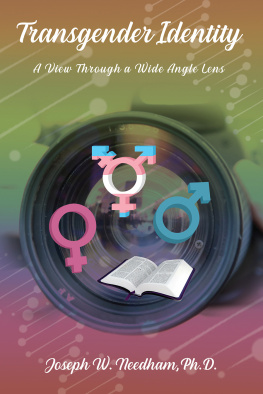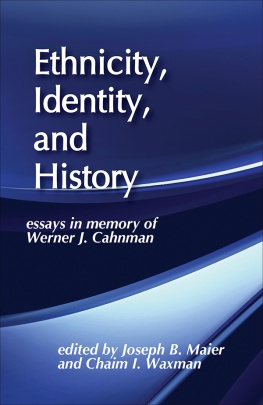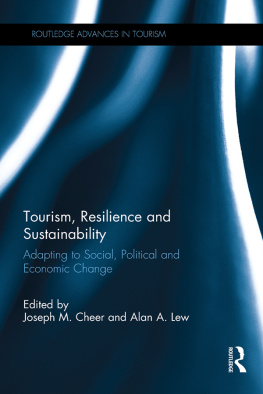First published 2000 by Transaction Publishers
Published 2017 by Routledge
2 Park Square, Milton Park, Abingdon, Oxon OX14 4RN
711 Third Avenue, New York, NY 10017, USA
Routledge is an imprint of the Taylor & Francis Group, an informa business
Copyright 2000 by Taylor & Francis.
All rights reserved. No part of this book may be reprinted or reproduced or utilised in any form or by any electronic, mechanical, or other means, now known or hereafter invented, including photocopying and recording, or in any information storage or retrieval system, without permission in writing from the publishers.
Notice:
Product or corporate names may be trademarks or registered trademarks, and are used only for identification and explanation without intent to infringe.
Library of Congress Catalog Number: 00-037390
Library of Congress Cataloging-in-Publication Data
Identity and social change / edited by Joseph E. Davis
p. cm.
Includes bibliographical references and index.
ISBN 0-7658-0034-9 (alk. paper)
1. Group identity. 2. Identity (Psychology) 3. Social change.
I. Davis, Joseph E.
HM753 .I34 2000
303.4dc21
00-037390
ISBN 13: 978-1-4128-5710-9 (pbk)
ISBN 13: 978-0-7658-0034-3 (hbk)
Introduction: Social Change and
the Problem of Identity
Joseph E. Davis
Identity is a problem. The concept emerged as a problem, and, if Zygmunt Bauman is correct, can only exist as a problem (1996: 19). On one level, identity is a problem because of the philosophical and moral weight it has been made to carry. Modern understandings of the selfidentity, the personhave been shaped by the emphasis on the cognitive and self-sustaining subject in Enlightenment philosophy, as well as by the stress on moral introspection and subjectivity arising from a number of crucial post-Reformation movements (Taylor 1989; Ferguson, this volume). These sources defined a conception of inwardness that assigned the self an inner depth, a power of disengaged reason, and a capacity and need for self-exploration. They freighted the self with a unity, consciousness, and moral charge it has been hard-pressed to bear. At least since Marxs theory of alienation, the integral and self-sufficient subject has been a recurrent topic of criticism and critique.
On another level, personal and social identities are a problem because of the destabilizing and uprooting social forces of modern life. Historic social changes, including the pluralization of authorities, the de-institutionalization of private life, the multiplication of role expectations and identity schemes, the disembedding from geographical place, the diversification of contexts of interaction, and the decline of overarching systems of meaning, together with accompanying changes in social practicesreligious, economic, familial, technologicalcreated a new uncertainty and a new task. The uncertainty and the task was how to place oneself amidst a pluralism of incommensurable beliefs and behaviors, maintain that placement, and have it recognized by others. While by no means distributed evenly in time or space, structural, institutional, and cultural transformations created, and continue to create, a distinctively new environment. In this environment identities must be constructed and situated amid competing cultural discourses and social practices, each of which tends to assert claims to priority. This pluralism creates not only challenges for individuals and identity-forming institutions, but, as Cascardi has argued, can also appear as contradictions within the subject-self (1992; cited in Calhoun 1994: 12).
These two ways in which identity is problematic are interrelated. The cognitive and moral weight attached to selves arose because social transformations and changes in social practices worked to produce a new problemization of subjectivity. At the same time, attributing a deep inwardness to the self made an increasingly pluralistic and free-floating environment the source of new forms and new levels of uncertainty about self-placement and self-definition and their recognition by others. Conceptions of the self and the task of placement/distinction, then, are related to each other and both are in turn related to changes in the broader environment.
Given this interrelationship, it should be unsurprising that during a time of rapid and profound change, as has been characteristic of postwar Western society, questions of identity have reappeared with a new force and a new urgency. No less than a veritable discursive explosion (Hall 1996: 1) has occurred in recent years around questions of self, subjectivity, agency, and multiple identities. These issues have been taken up by scholars of a wide variety, as well as by self-help writers, psychiatrists, business consultants, social movement activists, and many others. They are central to a host of current discussions dealing with such topics as the body, gender, ethnicity, therapy, citizenship, nationalism, education, postmodernism, multiculturalism, and ethics.
Amidst this outpouring of writing around the concept of identity, the most influential has emerged from the movements of identity politics and academic postmodernism. In these movements, attention is focused on the construction of difference, the solidarity of marginalized groups, and the epistemological status of the subject. While of far-reaching significance, both theoretically and socially, the circumscribed concerns of identity politics and postmodernism have led to a general neglect of the structural and institutional forces behind a wider problematization of identity. Moreover, particularly in postmodernist formulations, a disjunction has opened between discursive and social practices, with identity instability and fragmentation read not through structural or institutional changes but through the instabilities and fragmented nature of language and interpretation.
There is a need to expand the study of identity beyond issues of group-based identifications and epistemology. Identity and Social Change is a contribution to such an enlarged effort. Working from several vantage points and disciplines yet within a theoretical framework of identity as socially constituted, the contributors explore key social changes and social practices and the issues they raise for questions of subjectivity, identity, and identity formation. In the process, they also challenge key aspects of existing theoretical formulations and explore opportunities and prospects for the future.
To set the volume in context, I begin by briefly considering the currently dominant approaches to the study of identity and their limitations.
Identity and Difference
A concern to put identity into a context of social change is certainly not new; it has a long history in the social sciences. In addition to a persisting concern with the rise of the individual, for the postwar generation of scholars the conflict between individual needs and social demands, and the effects of this conflict and rapid social change for the adapting person, were central issues. Attention focused on the self-society nexus, along with concerns over the disruptions in self-concept and personality brought about by the significant social dislocations and transformations of mass societyurbanization, bureaucratization, the rise of a consumption ethic, technological advances, the decline of community, and so on. Further, many writers sought to trace the emergence of a new personality type or character, shaped by or adapted to changing social, cultural, and economic conditions. Other-directed (Riesman et al. 1950), an antinomian personality (Adler 1972), an untrammeled self (Bell 1976), and a narcissistic personality (Lasch 1979) are but a few of the influential ways in which the new character type was portrayed. Some writers in this tradition saw social changes leading to painful uneasiness and destructive alienation and instability. For others, however, the effects of change were believed to be more salutary, leading to experimentation with new and adaptive ways to meet social demands and efforts to break free from narrow and restrictive social roles.










